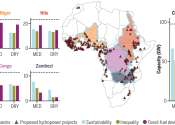Study shows renewable energy could partially replace diesel fuel to power instruments, provide heat at South Pole
A recent analysis shows that renewable energy could be a viable alternative to diesel fuel for science at the South Pole. The analysis deeply explores the feasibility of replacing part of the energy production at the South ...
Apr 8, 2024
0
1









